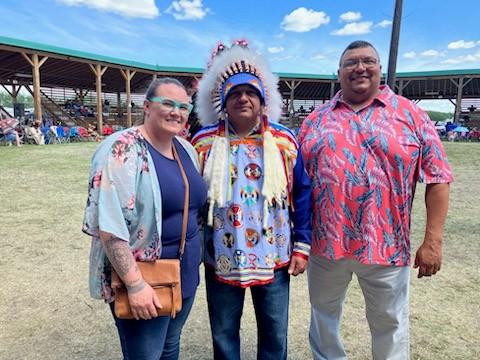DSW alum uses policy and research skills to inform programming
Dr. Jennifer Robertson, DSW, LCSW, RCSW, is licensed in Oklahoma, Idaho, Colorado, Utah, Washington, and Alberta, Canada. She’s working on licensure in Louisiana. Part of a military family, she moves around a lot – which means she’s held a lot of social work jobs.
“If you think you might like it, you should try it out,” Robertson said. “I've gotten to work with the military, I've gotten to do inpatient with teens, and I've gotten to do outpatient with all ages. Just having all these different opportunities has helped me to grow both as a person and as a social worker.”
To continue that trajectory of growth, Robertson began pursuing her Doctor of Social Work (DSW) at Tulane in 2021. She wanted to be prepared to lead, to impact policy, and to make a difference on a larger scale.
“Your Master of Social Work (MSW) program does prepare you for some leadership roles, but the doctoral program really prepares you to be a leader in the field, not just your agency.”
Currently, Roberston is an Area Manager at Recovery Alberta, the provincial mental health, addiction, and corrections system. In that role, she manages six addiction and mental health clinics, nine contracts, and two travel teams.
“I'm not sure that I would be prepared enough to do this role that I'm doing without my doctorate,” Roberston said. “The doctoral program really taught me how to think bigger. I spend a lot of time looking at policies and thinking about how it applies to my team.”
One particularly important thing she learned while pursuing her DSW was how to read policy to find “wiggle room” that allows clinicians to stay within the set parameters and best meet clients’ needs. Social work, she says, is journalism. At the macro level, it’s investigating infrastructure and laws. For clinicians, it’s really digging deep into clients’ lives and stories.
During her DSW program, Robertson co-wrote and published two systematic reviews about laws and social work competency surrounding involuntary hospitalization. That research allowed her to look at different policies – and the implications of those policies – across the United States. The work, she says, was not easy, but it was rewarding.
“I remember asking myself if I could do this,” Robertson said. “The answer was yes. Yes, I could do that.”
To keep herself grounded through difficult tasks, Robertson enjoys traveling and, of course, spending time with her dogs. But what really keeps her centered day-to-day is focusing on the good, rather than the bad. Most people who seek social workers’ support, she says, are not doing so because things are going well for them. But Robertson encourages social workers not to let struggles eclipse successes – maybe a client had a breakthrough, or a child got an extra meal, or someone began their journey toward recovery.
“The work that we do is hard. We need to look at our wins. And sometimes our wins are really, really small – so small that sometimes we miss them. But those are the things that keep us going.”

